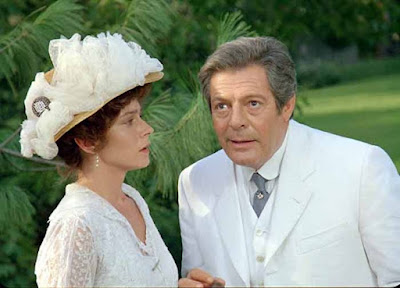Dark Eyes is a 1987 film based on the short stories two short stories by Anton Chekov, "The Lady with the Little Dog" and "The Name-Day Party." It stars Marcello Mastroianni as Romano Patroni, an Italian man who marries a wealthy woman, yet falls in love with a Russian woman.
 |
| Marcello Mastroianni and Yelena Safonova in a scene from Dark Eyes. |
A trained architect from a poor family, Romano lives the life of the idle rich. Even his wife, a wealthy heiress, mocks his architectural drawings and long-dead ambitions. They have settled into comfortable late middle-age, with a married daughter and grandchildren. But Romano's restlessness and feelings of inferiority and purposelessness lead him to a health spa where he meets a Russian woman in similar circumstances (unhappy marriage), who manages to capture his heart. But these feelings of incipient love disturb the lady, who flees back to Russia, but not before leaving Romano a note saying their love is impossible, and will only lead to heartbreak.
Not to be deterred, Romano concocts a plan to visit the woman in Russia, to see if it was just a passing infatuation or true love that requires deeper commitment. The journey is difficult in turn of the century Russia, but Romano manages to meet his lady love in her town and their mutual feelings are confirmed and renewed. Romano promises to return for her, a hope on which she pins all her happiness.
Dark Eyes is in the same genre as Forrest Gump or Candide, the story of an innocent person whose innocence is his strength and whose gentle manner makes him likely to be ignored--by all but a jealous "insider" who knows him too well. Usually the innocent hero in these stories undergoes a transformation, but in the case of Romano, he fails this crucial test. His wife is the jealous insider who knows his weaknesses too well, and exploits them to her advantage.
When this movie came out in the 1980's I was young (20s) and went to see it numerous times. I was captivated by the story, especially the metamorphosis of Romano as played by Marcello Mastroianni, an actor I had come to admire. But I didn't understand the ending, I didn't understand the passion between the two lovers, and I didn't understand what went wrong. Now that I am much older and hopefully a little wiser, I think the meaning of Chekhov's story is that there is a great danger in not living one's truth. That when a person participates in a lie, he becomes corrupted and distorted by the lie. He can't continue to live in the lie because to do so means he will lose all respect for himself as he watches himself become corrupted by falsehood and deception. No matter how difficult the truth, one must summon the bravery to live it, to not deny it, and to avoid the comfort of easy lies. Even if it hurts people, they will heal. Life will go on. But there is no hell like the hell of living a lie. The movie is a morality tale about living one's truth. It is a warning to anyone who thinks that participating in a lie will not cause them harm. Yes it will. Denial of the truth means being complicit in the lie. And a lifetime of lies becomes a very heavy burden to carry. At the end, Romano learns the awful truth, that self-deception is the worst deception of all.
 |
| Marcello Mastroianni learns the burden of living a lie in Dark Eyes. |
No comments:
Post a Comment